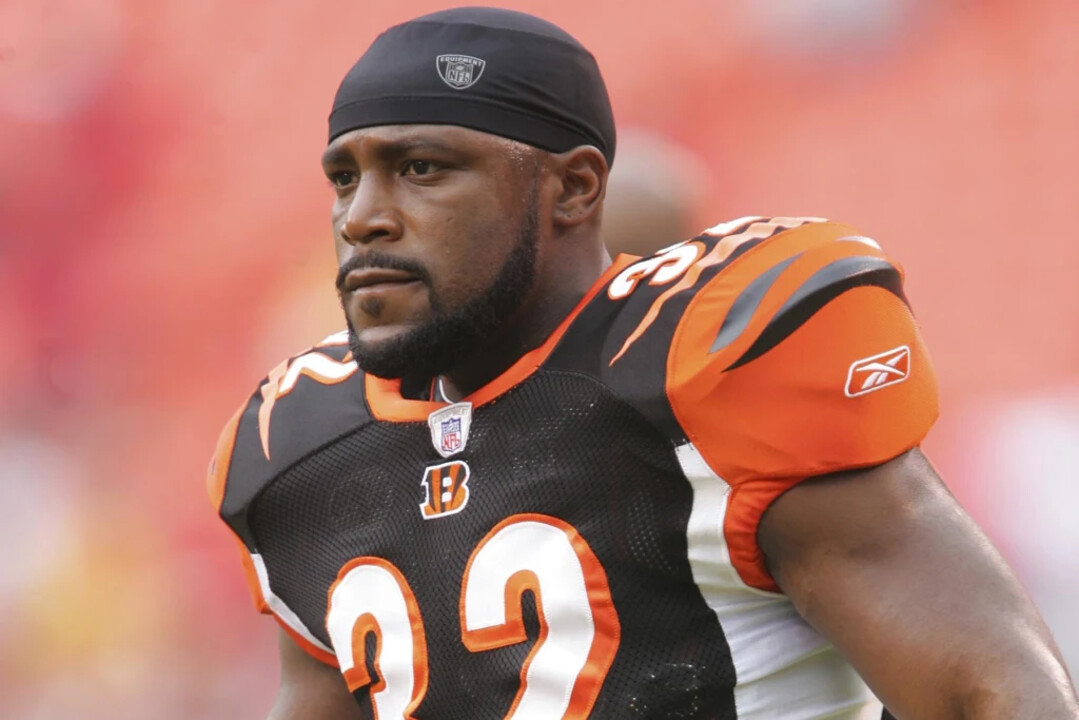The football world is mourning the loss of former Cincinnati Bengals Pro Bowl running back Rudi Johnson, who died by suicide on Monday, September 23, 2025, at the age of 45. Authorities in Florida confirmed the tragic news, which has sparked renewed conversations about mental health and the long-term effects of football-related head injuries. Johnson, remembered for his powerful running style and quiet generosity, was found at his home in Sunny Isles Beach.
His passing was confirmed by his family and the Miami-Dade Sheriff’s Office, which stated that “no foul play is suspected” and that all indications point to suicide. A source close to Johnson’s family revealed to news outlets that the former NFL star had been struggling with significant mental health challenges, possibly linked to chronic traumatic encephalopathy (CTE), a degenerative brain disease associated with repeated head trauma. Despite his private battles, those who knew him emphasized that in the time leading up to his death, he remained deeply committed to helping others in his community.
A Stellar Career Marked by Consistency and Grit
Rudi Johnson’s path to NFL success was a testament to his determination. Born on October 1, 1979, in Virginia, he first made a name for himself at Auburn University, where his phenomenal junior season—rushing for 1,567 yards—earned him the prestigious SEC Player of the Year award. The Cincinnati Bengals drafted him in the fourth round of the 2001 NFL Draft, but his career started slowly as he played backup to Pro Bowl runner Corey Dillon.
His breakthrough came in the 2003 season when he rushed for 957 yards and nine touchdowns. This was just a preview of his incredible durability and production. From 2004 to 2006, Johnson became one of the league’s most dependable running backs, reeling off three consecutive seasons with at least 1,300 rushing yards and exactly 12 touchdowns each year. His 2004 season, where he rushed for a career-high 1,458 yards, earned him a Pro Bowl selection and cemented his place in Bengals history; his 2004 and 2005 campaigns remain the top two single-season rushing performances in franchise history.
Bengals president Mike Brown remembered him as “a fine person and an excellent running back for us… dependable and productive, and very popular among his teammates.”

After seven seasons with the Bengals, hamstring injuries began to slow him down, and he finished his eight-year NFL career with the Detroit Lions in 2008. Over 95 games, Johnson amassed 5,979 rushing yards and 49 rushing touchdowns. Beyond the stats, he was known as a quiet leader who disdained self-promotion and preferred to let his hard work on the field do the talking.
You Might Like: Was Charlie Kirk Problematic?
A Silent Struggle and a Lasting Legacy
In the years following his retirement, Johnson dedicated himself to philanthropy, founding the Rudi Johnson Foundation to help underserved children and families. His agent, Peter Schaffer, described him as a man who “lived his life in the service of others” and whose legacy would be measured not by statistics, but “by the countless lives he touched and the love he gave so freely.”
However, behind this positive public presence, Johnson was facing serious private challenges. While a formal diagnosis of CTE has not been publicly confirmed, his family and agent believe the effects of the disease, caused by years of absorbing hits on the football field, played a significant role in his mental health struggles. Schaffer used the tragedy as a “call to action,” urging the NFL and scientific community to commit to more research, innovation, and support for those living with CTE. His death echoes that of other former players and highlights the ongoing concern about head trauma in contact sports.
Rudi Johnson’s death is a profound loss. He is remembered as a loving father, a dedicated family man, and one of the most productive players in Cincinnati Bengals history. His story is now a painful part of a larger conversation about the well-being of athletes long after their final game has been played. For those in crisis, the Suicide & Crisis Lifeline can be reached by calling or texting 988.



